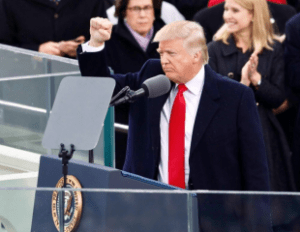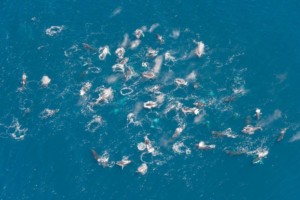Stephan: Here is just the impact on some of the science research. We are giving away our technological lead in three ways: First, not adequately funding research which is the largest source of new jobs. Second, stopping immigrants entrepreneurs and researchers from coming to U.S. and doing start ups. Third, by gutting regulations and corrupting science reporting with corporate influence introduces unclarity, like static on a telephone line.
The Trump administration is committing all three errors.

President Donald Trump’s plan to cut billions of dollars in funding to medical and scientific research agencies would cost the country countless jobs, stall medical advances and threaten America’s status as the world leader in science and medicine, advocates said Thursday.
“Cutting the funding in this way will have devastating and generation-long effects,” said Dr. Clifford Hudis, CEO of the American Society of Clinical Oncology, which represents cancer specialists.
“[Medical research] is a fundamental driver of American economic strength and it is being compromised here,” Hudis told NBC News. “It’s a jobs program.”
Multiple organizations expressed shock and disappointment at Trump’s budget proposal, which adds $54 billion in defense spending but would slash nearly $6 billion from the National Institutes of Health, which funds most basic medical research in the country, as well as […]
No Comments
Sangeeta Bharadwaj Badal, - The Gallup Organization
Stephan: Here is the data upon which the conclusions I mentioned in the previous report are in part based.
Trump has been in office less than two months, and he has already severely damaged our long term economy. Here are the facts,
 As debates about immigration intensify, particularly in the U.S. and Western Europe, countries should consider that many entrepreneurial migrants are job creators. Given this, should societies be so quick to hang “keep out” signs?
As debates about immigration intensify, particularly in the U.S. and Western Europe, countries should consider that many entrepreneurial migrants are job creators. Given this, should societies be so quick to hang “keep out” signs?
A 2012 study based on Current Population Survey (CPS) data from the U.S. Census Bureau, found that migrants are more likely to start a business in any given month in the U.S. According to this study, in 2010, for every 100,000 immigrants, 620 started businesses each month. The rate for native-born adults, however, was much lower, at 280 new startups per 100,000.
The study also found that the existing business-ownership rate is higher for migrants than native-born adults in America: 10.5% of the migrant workforce own a business, compared with 9.3% of the native-born labor force.
A similar study in 2011 by Partnership for a New American Economy found that migrants or their children founded more than 40% of the 2010 Fortune 500 companies in the U.S.
Historically, the U.S. has been able to attract numerous foreign business builders. But does this same pattern emerge for the rest of the world? Gallup’s Builder […]
No Comments
Thursday, March 16th, 2017
Steven Rosenfeld , - Alternet
Stephan: The choice is ours; are we up to it? What is it we really want?

Credit: White House
How close is President Donald Trump to following the path blazed by last century’s tyrants? Could American democracy be replaced with totalitarian rule? There’s enough resemblance that Yale historian Timothy Snyder, who studies fascist and communist regime change and totalitarian rule, has written a book warning about the threat and offering lessons for resistance and survival. The author of On Tyranny: Twenty Lessons from the Twentieth Century talked to AlterNet’s Steven Rosenfeld.
Steven Rosenfeld: Three weeks ago, you said that the country has perhaps a year ‘to defend American democracy.’ You said what happens in the next few weeks is crucial. Are you more concerned than ever that our political culture and institutions are evolving toward fascism, resembling key aspects of the early 20th-century European regimes you’ve studied?
Timothy Snyder: Let me answer you in three parts. The first thing is that the 20 lessons that I wrote, I wrote on November 15th. The book, On Tyranny, was done by Christmas. Which means if people read it now, and people are reading it, and it’s […]
1 Comment
Thursday, March 16th, 2017
Peter Urban, - Scientific American
Stephan: Republican controlled states emboldened by what is happening at the Federal level with the Trump Administration, are doing their best to gut regulations special interests in those states do not like -- things like the Endangered Species Act.
It's up to you folks. Not only the humans in your state but the other beings of the Earth are depending on you. Nobody else is going to do it.

The red-cockaded woodpecker is an endangered species in Arkansas.
Credit: U.S. Department of Agriculture Flickr
More than a dozen state attorneys general are asking Pres. Donald Trump to throw out recent federal rules regulating the environment for endangered or threatened plants and animals. The states claim the rules, which enlarge the definition of species habitat, give the federal government excessive power over state and private lands.
The rules govern implementation of the Endangered Species Act (ESA), and were made a year ago by Pres. Barack Obama’s administration. In January the state officials sent a letter to the Trump transition team asking for repeal, arguing the rules will cost states and private land owners billions of dollars by blocking or delaying the use or development of their properties. “It’s such a massive land grab by the federal government,” Arkansas Attorney General Leslie Rutledge says. But at least one study shows implementation of the ESA has affected very few development projects during the current decade.
Rutledge, along with Alabama Attorney General Luther […]
2 Comments
Thursday, March 16th, 2017
Sara Chodosh, - Popular Science
Stephan: Here's a little science mystery no one can answer.

The humpback’s scientific name, Megaptera novaeangliae, literally means “big-winged New Englander.” They can use their “big wings” to maneuver backwards, though they have no beeping sound to warn other animals that they’re putting it in reverse.
Credit: Jean Tresfon/PLOSone
The world is ending and only the whales know. At least, that’s one explanation. Humpback whales are normally pretty solitary—scientists used to call groups of 10 to 20 “large.” Now they’re congregating in groups of 20 to 200 off the coast of South Africa. Something is definitely going on here, but so far experts are stumped.
In fact, Humpback whales aren’t supposed to be hanging out in that region in the first place. Humpbacks migrate up to tropical waters to breed, but they typically feed down south in the icy waters of Antarctica this time of year. Yet scientific expeditions keep seeing these super-pods (not to be confused with super PACs, which are equally giant but much more dangerous), which were finally compiled and published at […]
1 Comment

 President Donald Trump’s plan to cut billions of dollars in funding to medical and scientific research agencies would cost the country countless jobs, stall medical advances and threaten America’s status as the world leader in science and medicine, advocates said Thursday.
President Donald Trump’s plan to cut billions of dollars in funding to medical and scientific research agencies would cost the country countless jobs, stall medical advances and threaten America’s status as the world leader in science and medicine, advocates said Thursday. As debates about immigration intensify, particularly in the U.S. and Western Europe, countries should consider that many entrepreneurial migrants are job creators. Given this, should societies be so quick to hang “keep out” signs?
As debates about immigration intensify, particularly in the U.S. and Western Europe, countries should consider that many entrepreneurial migrants are job creators. Given this, should societies be so quick to hang “keep out” signs?











